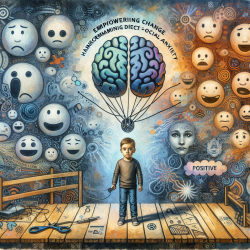Easy Ways to Boost Your Online Therapy Skills with Insights from ECRD 2016

The 8th European Conference on Rare Diseases & Orphan Products (ECRD 2016) brought together some of the brightest minds in the field to discuss the latest advancements and research. For practitioners providing online therapy services, like those at TinyEYE, the insights from this conference can be incredibly valuable. Here's how you can implement these findings to enhance your skills and improve outcomes for your students.
Understanding the Importance of Early Diagnosis and Treatment
One of the key takeaways from the conference was the significance of early diagnosis and treatment in managing rare diseases. This is particularly relevant for online therapists working with schools. By being aware of the early signs and symptoms of rare diseases, you can advocate for timely interventions that can make a significant difference in a child's development.
Implementing Patient-Centered Care
The ECRD 2016 emphasized the need for a holistic, patient-centered approach to care. For online therapists, this means tailoring your therapy sessions to meet the unique needs of each student. Consider incorporating the following strategies:
- Develop individualized therapy plans that address the specific challenges faced by each student.
- Engage with parents and caregivers to understand the child's home environment and support system.
- Utilize technology to create interactive and engaging therapy sessions that can be easily adapted as the child's needs change.
Leveraging Technology for Better Outcomes
The conference highlighted several innovative technological solutions that can aid in the management of rare diseases. As an online therapist, you can leverage these technologies to enhance your practice:
- Use mobile apps and digital tools to track progress and communicate with parents and caregivers.
- Incorporate virtual reality and augmented reality tools to create immersive therapy experiences.
- Utilize data analytics to monitor the effectiveness of therapy sessions and make data-driven decisions.
Encouraging Further Research
While the insights from ECRD 2016 are invaluable, the field of rare diseases is continually evolving. As a practitioner, it's essential to stay updated with the latest research and advancements. Consider the following ways to stay informed:
- Join professional organizations and attend conferences focused on rare diseases and online therapy.
- Subscribe to journals and newsletters that publish the latest research in the field.
- Collaborate with researchers and other practitioners to share knowledge and best practices.
Conclusion
Implementing the outcomes of the research presented at the 8th European Conference on Rare Diseases & Orphan Products (ECRD 2016) can significantly enhance your online therapy practice. By focusing on early diagnosis, patient-centered care, and leveraging technology, you can provide more effective and personalized therapy to your students. To read the original research paper, please follow this link:
8th European Conference on Rare Diseases & Orphan Products (ECRD 2016).
Citation: Schlander, M., Holm, S., Nord, E., Richardson, J., Garattini, S., Kolominsky-Rabas, P., ... & Castro, R. (2016). 8th European Conference on Rare Diseases & Orphan Products (ECRD 2016). Orphanet Journal of Rare Diseases, 11(Suppl 1), 515. https://doi.org/10.1186/s13023-016-0515-y










